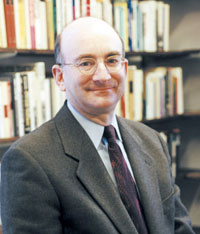|
|
 |
 |
 |
 |
|
Around the QuadsHistorian Brinkley Named University ProvostBY TIMOTHY P. CROSS
Alan Brinkley, the Allan Nevins Professor of History and one of Columbia's most popular professors, will become Columbia's next provost and dean of faculties, effective July 1. Brinkley, the history department chair, will replace Jonathan C. Cole '64, provost since 1989, who announced last spring his intention to return to teaching and research. Brinkley, 53, is a distinguished scholar of modern American history; he joined the Columbia faculty in 1991 and has been chair of the history department since 2000. His published works include Voices of Protest: Huey Long; Father Coughlin and the Great Depression, which won the 1983 National Book Award; The Unfinished Nation: A Concise History of the American People (2000), now in its third edition; The End of Reform: New Deal Liberalism in Recession and War (1995); and Liberalism and Its Discontents (2000). He is working on a biography of Henry R. Luce. In announcing the appointment, which was made after a national search, University President Lee C. Bollinger praised Brinkley as "one of the most distinguished historians in the United States and a superb teacher. Throughout his career, Alan has demonstrated an unwavering commitment to academic excellence. We are very fortunate that Alan now is prepared to direct his extraordinary talents to helping Columbia build its future." The appointment came as a surprise to Brinkley, who first learned that he was being considered when Bollinger offered him the job over dinner in March. "I had no idea," Brinkley told CCT. "The idea never crossed my mind." As provost, Brinkley will play a major role in shaping Columbia's future. The provost is Columbia's chief academic officer, with broad responsibility for the University's academic program. He directs the development and implementation of the University's academic plans and policies, supervises the work of its faculties, departments and research centers, and participates in the development of the University's annual budget and long-term financial plans. The provost also helps shape the faculty; he forms the ad hoc committees that consider tenure decisions and makes recommendations to the president for all Columbia appointments, including those for Barnard. Bollinger said that he expects to take a more active role in the University's academic affairs than his predecessor, but there will still be plenty for Brinkley to do. Even before he takes office, Brinkley will be consulted on two major academic appointments: the next dean for the Journalism School and a new vice president for Arts and Sciences to replace David Cohen, who will resign at the end of the academic year. Brinkley says he is approaching his new role without many preconceptions. "The areas I will focus on will be the areas that require attention," he says diplomatically. He does, however, anticipate playing an important role in Columbia's traditional strength in the liberal arts. "I see myself as being particularly involved with the arts and sciences, the College and the graduate school," he says. Although best known as a teacher and scholar, Brinkley has administrative experience. During his tenure as history department chair, the department decreased the number of graduate students admitted but provided them with better financial support. It further internationalized its course offerings and hired several new professors, as well. In addition, Brinkley introduced a program of Friday departmental luncheon seminars. Brinkley hopes to continue his research and teaching while serving as provost. "Maybe a course a year," he says of his classroom plans. Beyond his Columbia responsibilities, Brinkley has been a regular commentator on government, the economy and society. His essays, articles and reviews have appeared in scholarly journals and mainstream periodicals, including Newsweek, The New York Review of Books, The New Yorker, The New York Times Magazine, The New York Times Book Review, The New Republic, The Times Literary Supplement, The American Prospect and The London Review of Books, as well as CCT. Before joining Columbia, Brinkley, a Princeton graduate who earned his Ph.D. at Harvard, taught at MIT, Harvard and CUNY's graduate school. He has received fellowships from the American Council of Learned Societies, the Guggenheim Foundation, the Woodrow Wilson Center, the National Humanities Center, the Media Studies Center and the Russell Sage Foundation, among others. While teaching at Harvard, he received the Joseph R. Levenson Memorial Teaching Prize. Brinkley was inducted into the American Academy of Arts and Sciences in 1999. Brinkley is chairman of the board of trustees of the Century Foundation (formerly the Twentieth Century Fund), a member of the editorial board of The American Prospect and a member of the board of directors of the New York Council for the Humanities. In 1998-99, he was the Harmsworth Professor of American History at Oxford. Bollinger also announced an organizational change in the University's administration. Vice President for Health Sciences Gerald Fischbach - responsible for the medical school and nursing, dentistry and public health programs - now will report directly to Bollinger. All tenure cases, however, will continue to move through the provost's office and then to the president.
|
|
|||||||||||||||||||||||||||||||||||||||||||||||||||||||
